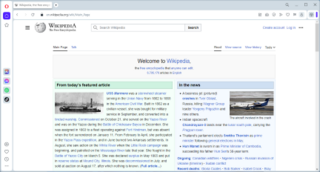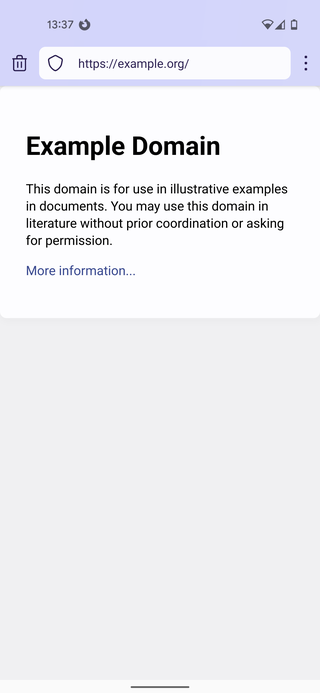
Safari is a web browser developed by Apple. It is built into Apple's operating systems including macOS, iOS, and iPadOS, and uses Apple's open-source browser engine WebKit, which was derived from KHTML.

Mozilla Firefox, or simply Firefox, is a free and open-source web browser developed by the Mozilla Foundation and its subsidiary, the Mozilla Corporation. It uses the Gecko rendering engine to display web pages, which implements current and anticipated web standards. In November 2017, Firefox began incorporating new technology under the code name "Quantum" to promote parallelism and a more intuitive user interface. Firefox is available for Windows 7 and later versions, macOS, and Linux. Its unofficial ports are available for various Unix and Unix-like operating systems, including FreeBSD, OpenBSD, NetBSD, illumos, and Solaris Unix. It is also available for Android and iOS. However, as with all other iOS web browsers, the iOS version uses the WebKit layout engine instead of Gecko due to platform requirements. An optimized version is also available on the Amazon Fire TV as one of the two main browsers available with Amazon's Silk Browser.

Maxthon is a freeware web browser, created by JeffChen in Singapore. It is available for Windows, macOS, Linux, and as Maxthon Mobile for Android, iOS, and Windows Phone 8. Since version 6, Maxthon is based on Chromium.
The following tables compare general and technical information for a number of web-based browser synchronizers. Please see the individual products' articles for further information. Unless otherwise specified in footnotes, comparisons are based on the stable versions.

Zotero is a free and open-source reference management software to manage bibliographic data and related research materials, such as PDF files. Features include web browser integration, online syncing, generation of in-text citations, footnotes, and bibliographies, an integrated PDF reader and note editor, as well as integration with the word processors Microsoft Word, LibreOffice Writer, and Google Docs. It was originally created at the Center for History and New Media at George Mason University, and, as of 2021, is developed by the non-profit Corporation for Digital Scholarship.

MediaFire is a file hosting, file synchronization, and cloud storage service based in Shenandoah, Texas, United States. Founded in June 2006 by Derek Labian and Tom Langridge, the company provides client software for Microsoft Windows, macOS, Linux, Android, iOS, BlackBerry 10, and web browsers. MediaFire has 43 million registered users and attracted 1.3 billion unique visitors to its domains in 2012.

Firefox for Android is a web browser developed by Mozilla for Android smartphones and tablet computers. As with its desktop version, it uses the Gecko layout engine, and supports features such as synchronization with Firefox Sync, and add-ons.

Opera is a multi-platform web browser developed by its namesake company Opera. The browser is based on Chromium, but distinguishes itself from other Chromium-based browsers through its user interface and other features.
Firefox Sync, originally branded Mozilla Weave, is a browser synchronization feature for Firefox web browsers. It allows users to partially synchronize bookmarks, browsing history, preferences, passwords, filled forms, add-ons, and the last 25 opened tabs across multiple computers. The feature is now included in Firefox and it's being implemented in Thunderbird.
Web Slices are a web feed technology based on the hAtom Microformat that allows users to subscribe to portions of a web page. Microsoft developed the Web Slice format, and published a specification under their Open Specification Promise. The specification is not published by any independent standards body. Introduced in Internet Explorer 8 Beta 1, Web Slices can be previewed in a fly-out window. As of 2012,, Internet Explorer 8 and 9 were the only browsers to support Web Slices natively, although Mozilla Firefox had support via an add-on called webchunks.

WebGL is a JavaScript API for rendering interactive 2D and 3D graphics within any compatible web browser without the use of plug-ins. WebGL is fully integrated with other web standards, allowing GPU-accelerated usage of physics and image processing and effects as part of the web page canvas. WebGL elements can be mixed with other HTML elements and composited with other parts of the page or page background.

Dolphin Browser is a web browser for the Android and iOS operating systems developed by MoboTap Inc. It was one of the first alternative browsers for the Android platform that introduced support for multi-touch gestures. Dolphin Browser uses its native platform's default browser engine.
WebRTC is a free and open-source project providing web browsers and mobile applications with real-time communication (RTC) via application programming interfaces (APIs). It allows audio and video communication to work inside web pages by allowing direct peer-to-peer communication, eliminating the need to install plugins or download native apps. Supported by Apple, Google, Microsoft, Mozilla, and Opera, WebRTC specifications have been published by the World Wide Web Consortium (W3C) and the Internet Engineering Task Force (IETF).

Simplenote is a note-taking application with Markdown support. In addition to being accessible via most web browsers, cross-platform apps are available on Android, Linux, Windows, iOS, and macOS.
Enyo is an open source JavaScript framework for cross-platform mobile, desktop, TV and web applications emphasizing object-oriented encapsulation and modularity. Initially developed by Palm, which was later acquired by Hewlett-Packard and then released under an Apache 2.0 license. It is sponsored by LG Electronics and Hewlett-Packard.

Mozilla is a free software community founded in 1998 by members of Netscape. The Mozilla community uses, develops, spreads and supports Mozilla products, thereby promoting exclusively free software and open standards, with only minor exceptions. The community is supported institutionally by the non-profit Mozilla Foundation and its tax-paying subsidiary, the Mozilla Corporation.
This is a comparison of mobile operating systems. Only the latest versions are shown in the table below, even though older versions may still be marketed.

Mercury Browser is a discontinued freeware mobile browser for Android, developed by iLegendSoft. Mercury Browser uses the Webkit engine. It was formerly available for iOS, but in 2017, it was removed from the App Store.

A progressive web application (PWA), or progressive web app, is a type of application software delivered through the web, built using common web technologies including HTML, CSS, JavaScript, and WebAssembly. It is intended to work on any platform with a standards-compliant browser, including desktop and mobile devices.

Firefox Focus is a free and open-source privacy-focused mobile browser based on Firefox from Mozilla, available for Android and iOS smartphones and tablets. Firefox Focus was initially a tracker-blocking application for mobile iOS devices, released in December 2015. It was developed into a minimalistic web browser shortly afterwards. However, it can still work solely as a tracking-blocker in the background of the Safari browser on Apple devices.












